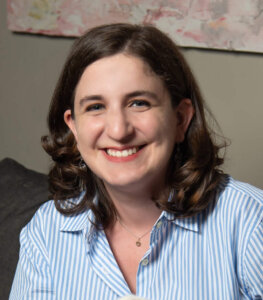Even if the Capital Jewish Museum shooter ‘did it for Gaza,’ his actions were antisemitic
Expressions of pro-Palestinian solidarity do not erase the suspect’s anti-Jewish hatred

A man, standing behind police tape, talks on his cell phone outside the Capital Jewish Museum following a shooting that left two people dead, in Washington, D.C., in the early hours of May 22. Two Israeli embassy staffers were killed in the shooting. Photo by Alex Wroblewski/AFP via Getty Images
The suspect who has been charged with shooting and killing two Israeli embassy staffers Wednesday night outside a Jewish professionals event at the Capital Jewish Museum chanted “Free Palestine” as he was being taken into custody. A witness told Jewish Insider that the suspect said “I did it for Gaza.”
To put this very plainly: The words “Free Palestine” themselves are not antisemitic. When I hear them chanted at a protest, or I read them in an op-ed, or when I see them graffitied around my neighborhood, I do not feel threatened. A call for the liberation and dignity for one group of people isn’t inherently a call for the denigration of my own safety and security.
But the words “Free Palestine” also do not magically erase antisemitism from, nor do Israel’s actions in Gaza automatically greenlight, an act that violently targets Jews.
Condemnation for this act has come from across the political spectrum. But there have also been, for example, social media comments responding to the story by saying that “anti-genocide is not antisemitism” or citing the number of Palestinian children killed in Gaza, or insisting that the victims “weren’t shot for being Jewish” but because they worked for the state of Israel (a fact the shooter may not have known). To be clear: It is antisemitic to seek out a Jewish event at a Jewish museum for an act of violence.
Calling for Palestinian people to be liberated may be a message of justice and dignity, but doing so immediately after attacking and targeting Jewish people does not in any way make the violent act just. (That Yaron Lischinsky was a Messianic Jew also does not change the fact that the shooter sought out an event for Jews in an explicitly Jewish space.)
We saw something similar just last month when the person accused of setting fire to Pennsylvania Governor Josh Shapiro’s residence on the first night of Passover suggested he was upset by Shapiro’s position on Israel. He may well have been outraged by the governor’s stance, or he may have been an opportunist using the war in the Middle East as justification. Either way, it does not change the fact that he targeted a Jewish official in his home on a Jewish holiday, an action that was both antisemitic and illegal. Disagreement with a governor’s policy position is not a license to set his home on fire.
The line of thinking for those who are defending this attack as not antisemitic is that it was motivated by injustice perpetrated by Israel, which is doing much worse to Palestinians in Gaza. But the motivation doesn’t change the fact that the shooting was carried out at an event by and for Jews (and not only Israelis) at a Jewish (and not Israeli) space. One may condemn every single action Israel has taken in Gaza; that doesn’t change the fact that two people were shot and killed.
Conversely, Israeli leaders are already blaming international critics of Israel’s conduct in Gaza for the attack. Diaspora Minister Amichai Chikli said on X, “Let us be absolutely clear: ‘Free Palestine’ is not a cry for liberty — it is a cry for murder. That was proven in blood today.” Israeli Prime Minister Benjamin Netanyahu invoked historical antisemitism, saying, “Blood libels against Israel have a cost in blood,” and Culture and Sports Minister Miki Zohar said, “When irresponsible and disgraceful politicians slander Israel with false accusations of genocide and war crimes, it’s no wonder antisemitism rises and Palestinian terrorists feel emboldened to carry out attacks.”
It’s wildly inappropriate to accuse people of bearing responsibility for this heinous attack because they engaged in peaceful protest against the war, or because they accused Israel of war crimes. Not only because this behavior assigns blame to political opponents who did not actually go to the museum and kill two people, but because it suggests that a country’s actions can’t be judged.
All countries, with governments and armies and power and policies, are open to criticism. And that criticism doesn’t give people license to shoot others. Peaceful protest and speech are the routes people should take to speak up and out against U.S. and Israeli policies and the governments carrying them out.
But that’s not what the suspected shooter did. He wasn’t engaged in principled protest. He wasn’t exercising his right to free speech. He wasn’t holding the powerful to account. He certainly wasn’t encouraging more humane policy change.
What he did was this: He went to a Jewish event at the Capital Jewish Museum and shot and killed two people. That was an antisemitic, violent, immoral act. No words shouted after — no call for freedom or dignity or justice — can change that.

















